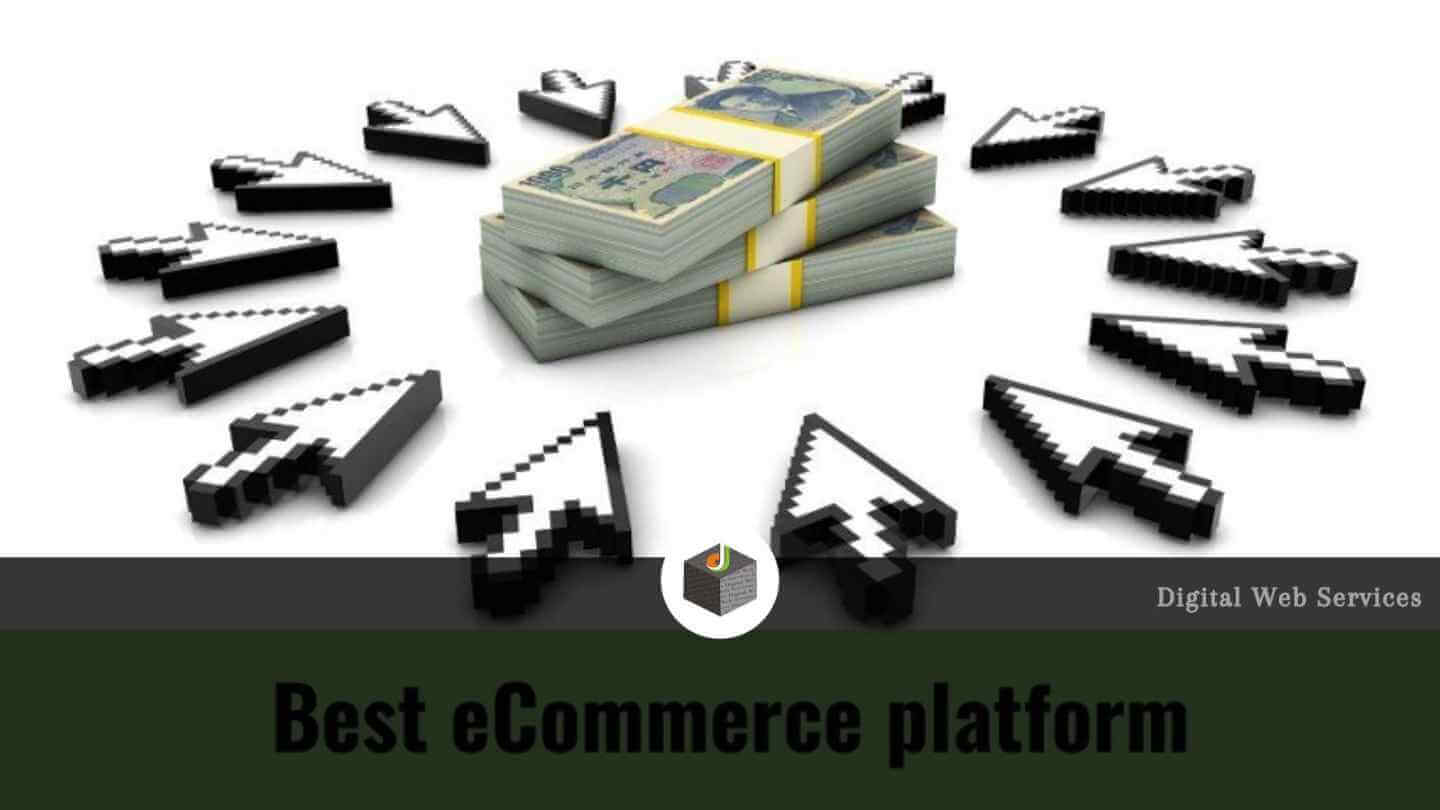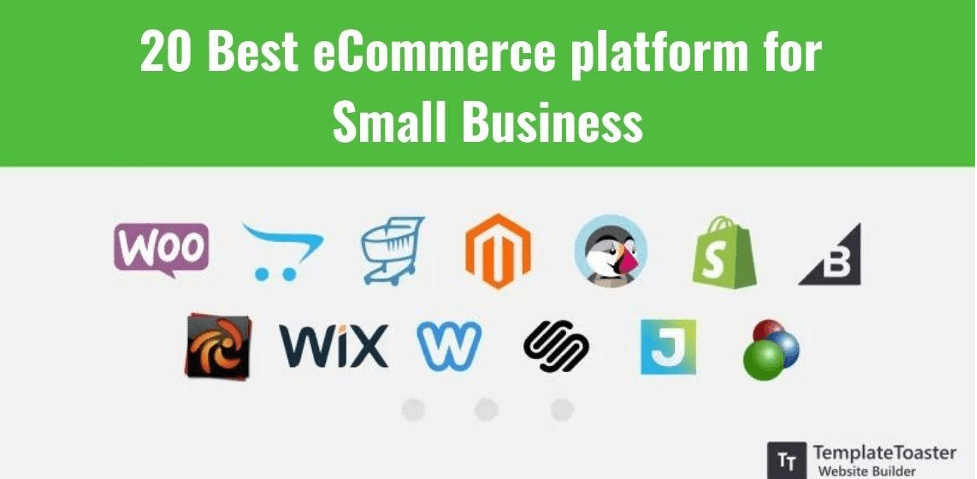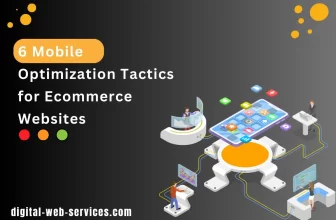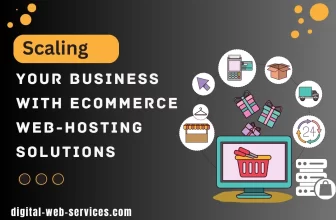
Ecommerce will be more popular than it has ever been in 2022. You’ll need to choose the correct eCommerce platform if you want to get in on the action – but what exactly is an eCommerce platform?
An eCommerce platform is software that aids in the management of an online store. It has the fundamental functionality you’ll need to sell things and accept payments online, as well as additional useful features.
Hosted and self-hosted eCommerce systems are the two most common types. A hosted platform, such as Shopify or BigCommerce, is one that is provided by a third party. In contrast, self-hosted systems, such as WooCommerce or Magento, are those that you host yourself. Both offer advantages and disadvantages, so it’s critical to select the best platform for your company.
How to Choose The Best eCommerce Platforms?
Depending on your company’s demands, several ecommerce systems are better than others. Some, like Shopify and BigCommerce, are safe bets for any business, but there are still some aspects to consider when picking the perfect platform. How technical are you?
Looking at our list, one of the major distinctions is the level of technical expertise required to set up and maintain your store. Adobe Commerce, for example, requires some technical expertise but gives users complete control over the design and feel of their store. Wix, on the other hand, does not require coding skills but offers less design flexibility.
In addition to this, you must make sure to present your products which are appealing to the customers. In such cases online photo editing services such as Uk Clipping Path helps you with all in one photo editing such as Image Clipping Path Services, background removal and more at the most affordable cost.
20 Best eCommerce Platform for Small Business

1.Shopify
Shopify is a cloud-based eCommerce platform that gives over 1 million businesses across the world the tools they need to run a successful online store. Shopify’s user base continues to grow at an astounding rate each year thanks to its broad collection of features and quick installation process.
What aspects of this system appealed to us the most? The app takes care of everything including your payment methods that you can do with your phone. It also assists you in removing any programming language knowledge you may have.
Shopify has some of the most advanced inventory management features available. According to Shopify, one of these online firms could be up and running in minutes. Users can choose from a number of templates or develop their own store. For security, the platform accepts a wide range of credit cards and offers Level 1 PCI and free SSL encryption.
2.Amazon
An Amazon Store could be an amazing ecommerce solution for your company if you’re searching for a means to exhibit products and reach new clients. With text, graphics, and video, Amazon templates let you create a unique purchasing experience. Multiple interactive pages allow you to tell your narrative and show off your distinctive brand.
Starting an ecommerce site can assist small businesses just getting started as well as major corporations trying to expand globally. With cheap starting and maintenance costs, running an internet store is less expensive than running a traditional store. You may launch products in front of 300 million Amazon customers across the world when you open an Amazon store.
3. Ebay
eBay is a well-known online marketplace known for auctions and direct-to-consumer sales. As a sales tactic, it’s also quite common among online shops. eBay is available in a number of countries. However, you may search for products in your area by entering your zip code.
Almost anything may be bought and sold here, and millions of transactions are made every day. Customers and sellers are drawn to eBay because of its entirely capitalistic orientation. An item is only worth what someone is willing to pay for it on eBay.
This means that retailers can charge a premium for collectibles, discontinued items, vintage items, rare commodities, or anything with a limited supply. As a result, eBay has become the preferred shopping destination.
4.Wix
If you’re looking for the greatest ecommerce platform for small businesses, go no further than Wix. Wix is an ecommerce solution provider that has been available since 2006. It is user-friendly and inexpensive. It’s ideal for small enterprises with little or no technical knowledge.
WIX offers templates in a variety of themes, including ecommerce possibilities, so you may start selling right away if you don’t have a lot of time or money. This platform offers extremely basic capabilities that allow anyone with no coding experience to easily build an ecommerce site.
Wix gives you access to plugins and add-ons that allow you to expand the functionality of your website. The more features you use, the higher your storage prices will be; however, beginners will benefit from the ease of use regardless of which bundle they select.
5.Magento
Magento is a popular eCommerce platform that is open-source. The price is very reasonable, making it one of the top eCommerce platforms for small businesses. It’s also loaded with appealing features that provide eCommerce stores with flexibility and scalability. You can customize your site based on your business needs with the built-in admin features.
6.OpenCart
OpenCart is an open-source shopping cart system that is simple to use. It is available for download and installation at no cost. The eCommerce platform also comes with a plethora of themes and plugins. Any server that meets OpenCart’s system requirements can host it. If you are tech-savvy and don’t require bespoke features, this platform is ideal.
7. Volusion
A young programmer and website builder created Volusion in 1999. They are now one of the most important ecommerce platforms, with $28 billion in sales and 30K+ merchants. They provide businesses everything they need to sell online without all of the extras, which is ideal if you’re on a budget.
Volusion is great for reporting and analytics, giving you a lot of data to help you make better decisions about how to grow your company. If you’re still in the early stages of your business, this might be the best tool for you. You could even supply stockholders with reports.
You can create a professional ecommerce site in minutes using Volusion’s simple website builder. You’ll have no trouble selecting from dozens of pre-designed themes.
8.SquareSpace
Squarespace, like Wix, isn’t just focused on ecommerce, so it’s a wonderful option if you want to incorporate ecommerce features into your site. Squarespace is very popular among creatives, so you’ll see a lot of people selling similar items to those found on Etsy. With that out of the way, there’s no reason you can’t use live chat for Squarespace in other sectors.
Squarespace’s simple dashboard allows users to quickly check and manage inventory, fulfill and deliver orders, and obtain important insights into site traffic, sales trends, and customer data. In a nutshell, Squarespace is a great ecommerce platform for designers who don’t want to mess around with sophisticated data sales software.
Squarespace is ideal for novices because it offers a wide range of beautiful designs and customization choices. It isn’t as advanced or adaptable as some other market-leading sites, such as Shopify, but it still has a lot to offer when it comes to setting up an online store.
9.Ecwid
Ecwid provides a cost-effective e-commerce platform for small firms and solo sellers. It finds a key sweet spot among the finest website builders and online store builders: more payment and sales choices, as well as premier, dedicated e-commerce features, all without charging a premium.
You have the freedom to turn any website into a functioning e-commerce platform by using Ecwid as a store plug-in, opening up the customization doors for all parts of a top-tier sales site, with the capacity to track and fine-tune e-commerce KPIs.
10.Square Online store
Square Online Store is ideal for launching an online store or expanding an existing physical store into the digital realm. You’ll be able to set up an online store using its simple website builder interface and crucial e-commerce capabilities, even if you have no or little technical or web development skills.
The platform’s free plan allows you to create a store and use e-commerce capabilities without having to spend anything up front. It’s also integrated with the Square suite of products, including the Square Point of Sale (POS) system, which streamlines the payment processing process.
11. BigCommerce
As it has options for businesses of various sizes, BigCommerce is ideal for anyone establishing a new business or relocating an existing one. The price is competitive with other e-commerce platforms, and you get a lot of value for your money. Plus, you can try out BigCommerce for free for 15 days before committing.
12. Etsy
Since 2005, Etsy ecommerce has been the go-to place for handmade sellers. Etsy has quickly developed into one of the most popular marketplaces, with over 2.1 million sellers.
Etsy is a marketplace where you may create an account and sell alongside a large number of other Etsy vendors. It bills itself as a “creative marketplace” that sells exclusively handcrafted, vintage, or craft items.
13.WooCommerce
WooCommerce, a WordPress extension, is consistently included as a CMS in a Quick google for web store software. One of the few free choices is WooCommerce. However, “free” comes with some strings attached: you’ll almost certainly have to pay for development, a domain name, hosting, and payment connections, among other things.
WooCommerce is wonderful because it can be as tiny or as large as you need it to be, making it perfect for businesses of all sizes. While there isn’t any dedicated support, because it’s a free, accessible solution, it has a sizable user base, with a large community of experts and a plethora of online resources.
WooCommerce is similar to WordPress in terms of ease of use. Because it’s also a WordPress extension, the learning curve is virtually non-existent. The process of adding a product is similar to that of adding a page or amending a post.
14. Shift4Shop
Shift4Shop aspires to be an all-in-one eCommerce software solution for today’s business owners. Shift4Shop has you covered if you’re searching for a solution that includes all of the tools you’ll need to create, market, and sell from the ideal online store. A vast choice of shopping cart software and ecommerce buy buttons are available.
There’s also a terrific inventory system that makes it simple for businesses to keep track of their sales and products. Shift4Shop also offers a lot of customization options, including the ability to change your theme at any time.
15.PrestaShop
PrestaShop is an eCommerce platform that allows for a great deal of customization. Because its basic features are free to use, it’s a wonderful option if you’re just starting off. This eCommerce platform is ideal for small businesses because it is simple to set up.
There are numerous themes, layouts, and modules to choose from. PrestaShop is available in a total of 40 languages. PrestaShop is available for free download and installation. Themes, extensions, and hosting, on the other hand, are not free. The cost of PrestaShop templates ranges from $75 to $359..
16.BigCartel
Is it necessary for aesthetic products to use more appealing themes to display their artwork? BigCartel considers it and reaches out to this target market. It’s an eCommerce platform designed specifically for creative entrepreneurs.
The service delivers artistic templates that are ideal for creative business owners at a reasonably reasonable cost. BigCartel’s objective and vision are, after all, to focus on small businesses. From 2005 to the present, they have provided platforms for selling t-shirts, merchandise, art, jewelry, and a variety of other items.
You could use the free version if your eCommerce store only has 5 things to sell. Building a website does not necessitate any coding knowledge. The main dashboard displays your company’s current state. Team of support personnel is available. Integration with Google Analytics Accept payments by PayPal, Square, and Stripe. The best aspect is that there are no fees associated with selling on the platform.
17.QuickEselling
Quick eSelling is a professionally managed and hosted ecommerce platform. The ecommerce website has a solid position in the industry due to its interactive pricing methodology. Even if you don’t know how to code, Quick eSelling allows users to set up an online marketplace for free.
With strong CRM and sales management capabilities, you may personalize your website to meet any brand style. The front end is fully customisable and offers high-quality themes that are also mobile-responsive. As previously stated, Quick eSelling is entirely free.
There are no one-time or monthly setup costs, and no transaction fees. With the free plan, you can upload 1000 items. You can upgrade to a premium plan if you have more merchandise or services to offer.
18.Selz
Selz is one of the cheapest ecommerce platforms that nevertheless delivers results. It has regular and pro plans. As a small firm, the regular plan will suffice. When designing your site, you have several options. With 24/7 customer assistance, you may schedule sessions to get your site up and running.
Selz makes it simple to select and deploy the theme that best suits your business. Simple to use platform. Selz is an excellent alternative for non-programmers and designers. They stress the use of easy-to-use tools to help your company establish a website. There are also several customization options to help you construct your ideal website.
19. Adobe Shop (Formerly Magento)
Adobe Commerce, previously Magento, is globally recognized. Adobe Ecommerce may be the best choice for your organization if you require an ecommerce website that converts visitors into paying clients. Nike, Procter & Gamble, and Cisco all use Adobe Commerce as their corporate eCommerce platform. The Adobe ecosystem is huge and diverse, but it isn’t great for non-coders. If you don’t have a developer on staff, you’ll need to get one.
20.Weebly
With Weebly, you can create a store in minutes. You may sell your stuff from anywhere without any technological knowledge. Weebly makes it simple for anyone to create an online store, even if they don’t know how to code. Setting up payment methods on Amazon and PayPal, as well as generating websites like “Shipment Tracking”, will take less than 5 minutes.
Weebly has many templates to help you present your company professionally. Connectors, plugins, and tools are available for metrics and social selling. This easy-to-use environment includes tools like Square for online payments, so you can be sure your transactions are secure.
FINAL WORDS
Every eCommerce platform has advantages and disadvantages. In the end, your decision will be based on the size of your firm and its specific requirements. This, like almost every other business decision, necessitates research and strategy.
The user interface is one of the most significant aspects of an eCommerce platform. You’ll need a platform that’s easy to use and intuitive. Your time is far too valuable to be squandered on technical difficulties. Your business will function more smoothly if you utilize an eCommerce platform that is simple to use.
Digital Web Services (DWS) is a leading IT company specializing in Software Development, Web Application Development, Website Designing, and Digital Marketing. Here are providing all kinds of services and solutions for the digital transformation of any business and website.










